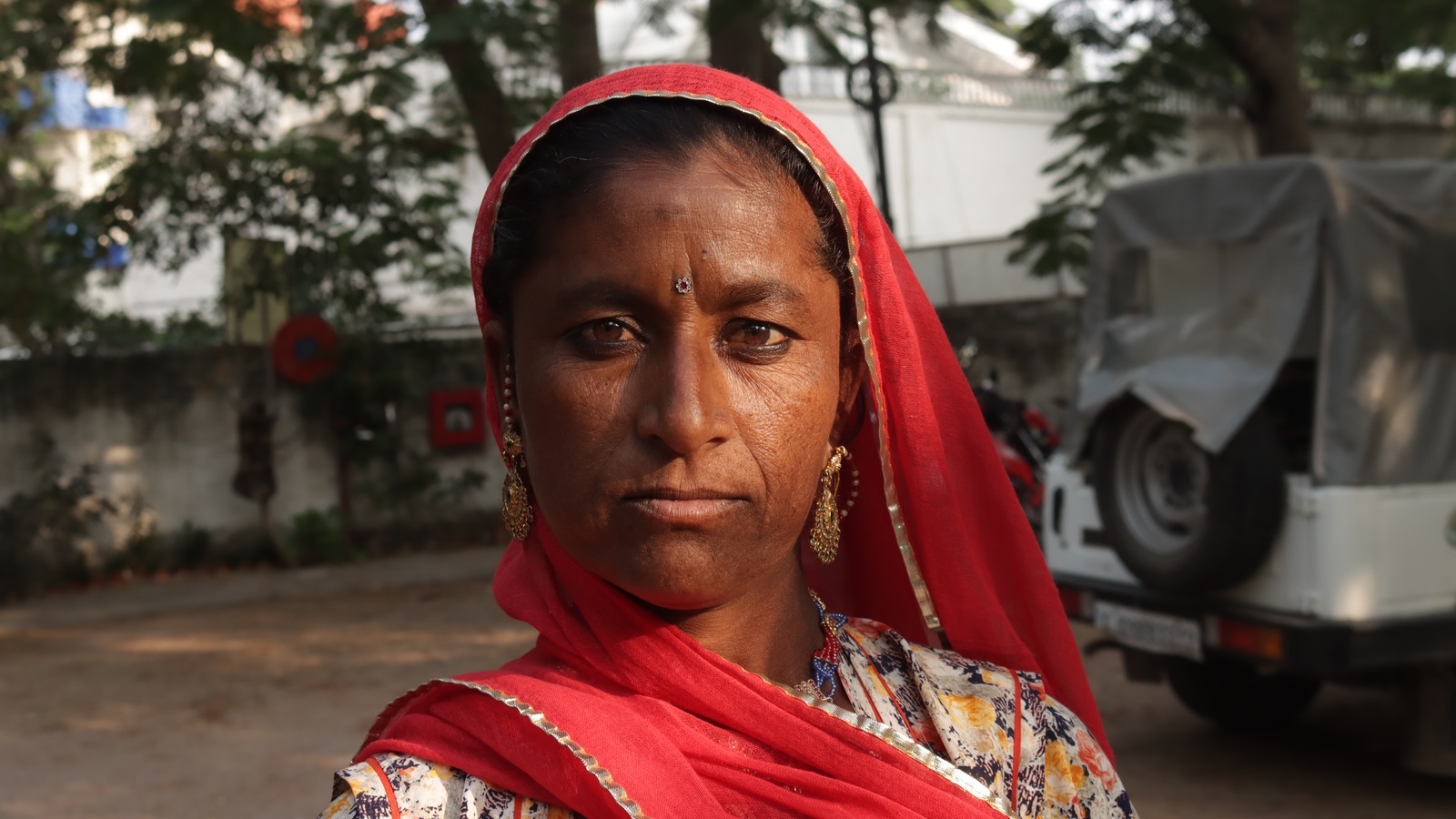
Hanifa Khan Manganiyar: The last of the feminist voices of the Manganiyar community

Hanifa Khan Manganiyar is one of the rare women folk singers from the Manganiyar community who has broken deep-rooted patriarchal taboos against women performing in public spaces. She carries forward the legacy of her mother-in-law, Rukma Bai Manganiyar, the first woman from the Manganiyar community to sing publicly despite strict community restrictions. The Manganiyars are a hereditary folk performing community, known for their vast repertoire preserved through decades of oral tradition.
When Hanifa sings, she doesn’t need a microphone. Her voice is dense, powerful, and endless—you could lose yourself in it. Through her vast repertoire, she offers a unique glimpse into the life and soul of desert life. It feels like the voices of countless women resilient across generations rise through her. She carries their strength and sorrow in her throat.
At this moment in time, Hanifa is not just a performer. She is one of the most precise, powerful, and irreplaceable voices of the Manganiyar tradition.
Alliance Francaise Jaipur is committed to showcasing marginalised voices of the folk communities of Rajasthan.
An Interview with Hanifa Khan Manganiyar
Q: Hanifa, can you tell us where your journey began?
Hanifa:
I was born in Sihani village, near the Barmer border right where India and Pakistan meet. My mother was from Pakistan and my father from India, and music ran through both their veins. From as early as I can remember maybe three or four I was singing. Music was all around me: my grandmother, my grandfather, my parents and everyone in our home sang.
My first memory of music is from when I was very small, humming “uh” and “aa” sounds while tapping on a tiny dhol. I didn’t know it then, but that rhythm has stayed with me all my life.
Q: Was music something you were taught formally, or did it come through family tradition?
Hanifa:
It was all through listening. That’s how Manganiyars learn through their ears , through living it. I would go with my grandmother to sing at our Rajput patrons’ homes, or with my father and grandfather to weddings, temples, rati jogas (those long, night-long devotional gatherings). I’ve never written or read a note of music, but I know over 300 songs—every one of them by heart.
Q: You come from a lineage of musicians, but women in your community singing publicly is rare. How did your journey take that path?
Hanifa:
That path came through my marriage. I was married very young around 11 or 12. My husband’s family included the late Rukma Bai Manganiyar, the first woman in our community to sing publicly. Rukma ji was paralyzed, and I became her caretaker. I would travel with her everywhere, and slowly, she began teaching me the art of performing on stage.
She used to tell me, "You must learn to sing from me—because if I die, our family will be in trouble otherwise." My first public performance was alongside her, at Shilpgram in Udaipur. That changed my life.
Q: What does singing mean to you personally?
Hanifa:
Singing is more than music for me, it's freedom. When I sing, all my stress, my anger, my struggles, they dissolve. It gives me peace. I sing for my children’s happiness. I sing for food. I sing for my sanity. Singing cools my mind like nothing else. And singing keeps me alive, inside.
Q: What challenges have you faced being a woman singer in the Manganiyar community?
Hanifa:
Plenty. Our community didn’t support my mother-in-law Rukma Bai. They don’t support me either. Because we broke the taboo—women were never supposed to sing in public. We still face backlash. People talk, judge. We have to stay careful. There’s jealousy, too.
When Rukma ji passed away, I had no choice but to provide for my children. I worked full-time in stone mines. I still go to Rajput households, singing for alms or sometimes even taking up labor work. After my husband passed away, I became the sole breadwinner for my nine children.
Q: Tell us about your life today, your family, your dreams.
Hanifa:
I’m in my 40s now. I live with my younger sons and daughter Sonu in Sayani village. My two elder sons work elsewhere and visit monthly. My house was washed away in the floods. We live in a temporary shelter. I dream of building a pakka house, getting invited to big music festivals, maybe even traveling abroad like Rukma ji once did. I want to sit in a plane, perform on a stage in another country, and see my children settled.
Q: You’ve mentioned singing Sindhi kalams and bhajans, can you tell us more about that spiritual blend in your songs?
Hanifa:
Yes. Manganiyars are Muslim by faith, but our music is beyond religion. We sing praises of Hindu gods and Muslim pirs. I learned Sindhi kalams from my mother.
Q: Where do you perform these days, Hanifa?
Hanifa:
I still sing for my patrons regularly. On special occasions like weddings, rituals, I go to their homes and sing. That tradition hasn’t stopped.
And now I also perform in public programmes and festivals. I’m part of a musical theatre group called "Main Jo Karti Hoon, Woh Kyun Karti Hoon?" (Why I Do What I Do). We are five women artists from different folk performing communities of Rajasthan. We come together to tell our stories through song and performance.
We’ve performed this piece at festivals, and every time I sing with them, I feel proud not just for myself, but for all women like me who’ve come forward despite everything.
Q: Tell us more about the kind of songs you sing.
Hanifa:
My songs come from both sides—Hindu and Muslim. That’s the Manganiyar way. I sing to pirs, to Ram, Krishna, Shiva, to the goddesses. Some songs are for weddings, some for bhakti, some for festivals, some for deep sadness. I carry them with me. I keep singing them at home, and I also teach my children. My sons, my daughter Sonu—they all learn from me now.
To give you a glimpse of Hanifa’s rich and vast memory of over 300 traditional songs, here is the transcript and translation of one of her personal favourites — Meera Re Janama | मीरा रे जन्मा
This song is about Meera, a proto-feminist 16th century devotional singer of Rajasthan (also known as Mirabai) who was married to a local king. She fought against feudal patriarchy to pursue her love for god. She was prohibited to sing with other male monks and to be in public spaces. This song recounts the story of her birth and her love for the god while breaking social barriers.
मीरा रे जन्म्या रे
एकम ने बुधबार
Meera was born on
First day of the moon cycle on a Wednesday
सोने रे सजाये नाडो मोदियो
अरे रे राणा जी मारे डोरी लागि
हरी रे नाम री
In the redness of rising sun, the umbilical cord was clipped
Oh king ! I am in love with
Name of the god
आये राणाजी मारे थुडीया रे जीवणा
अनता मर जावणा
Oh King ! My life is anyways very little
At the end of it, we all have to die
आवे राणाजी मारे केकु ने केसर रा पगल्या मंडिया
भगवा किया हरी रे नाम रा
Oh King! My footprints are printed in the vermillion and saffron
I am wearing saffron clothes with god’s name printed on it
Stay Tuned
You’ll get to know more about Hanifa Khan Manganiyar in our upcoming event, Folk Sabha — an interactive conversation and musical performance featuring three generations of Manganiyar women musicians.
As of now, there is hardly any information about Hanifa Khan Manganiyar available online—no videos, recordings, or documentation. Through Folk Sabha, we also intend to create a digital presence for her work and existence, so that her voice, story, and legacy can be known and remembered beyond her immediate community.
Join us to listen, learn, and witness how their voices carry stories, resilience, and the living legacy of a rich musical tradition.
Link to one of Hanifas’s song, mixed by leema ko - Listen Here
Interview by Suruchi & Supriya with contribution from Kheta Khan Manganiyar (Hanifa’s son) and Vinit Agarwal.
Credits: Vipin Jangir, Simran Kanwaria


